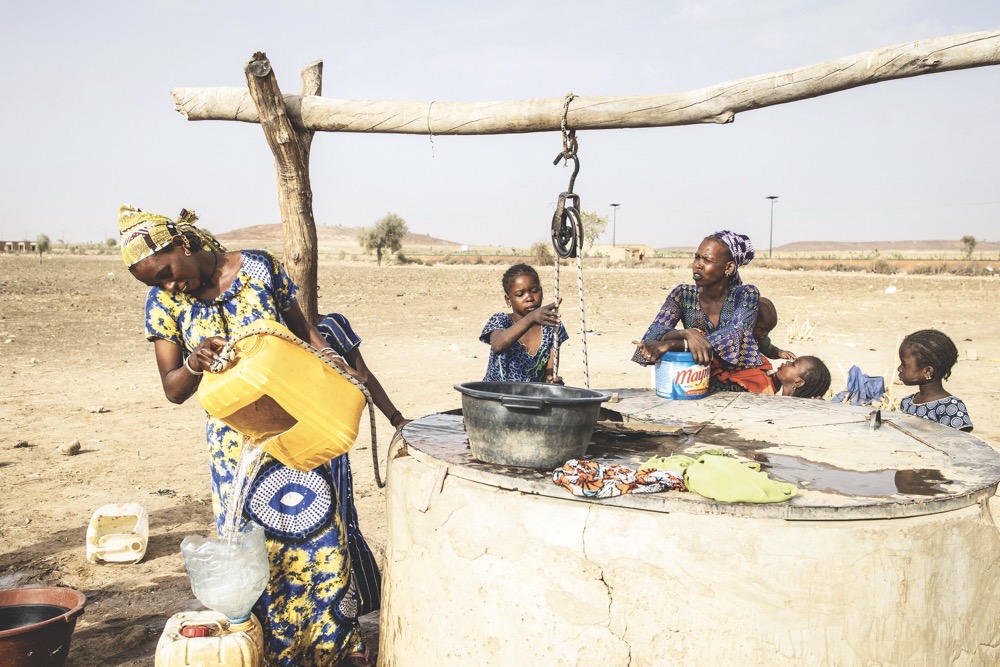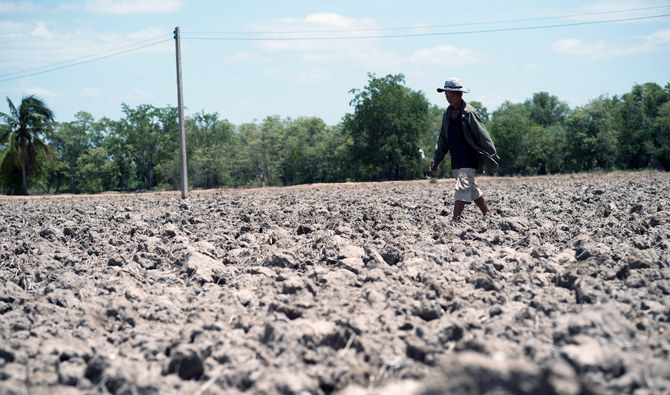JEDDAH: Water is essential for all forms of life on Earth, but extreme climate events and poor resource management have raised the specter of water scarcity, presenting nations and vulnerable ecosystems with complex challenges.
According to the UN, 2 billion people, roughly one-quarter of the world’s population, do not have consistent access to clean drinking water. Furthermore, almost 60 percent of the global population, around 4.5 billion people, suffer severe water scarcity at least one month per year.
Dr. Khulood Rambo, a Saudi-based water and clean energy expert, told Arab News: “We know that water demand will increase by 55 percent by 2030. Food demand will increase by at least 60 percent at the same time, due to the population increase and urban boom, all the while dealing with the effects of climate change.”
On Sept. 4, Crown Prince Mohammed bin Salman announced the establishment of the Global Water Organization aimed at harmonizing state and private-sector efforts internationally to combat water waste and promote sustainable usage.
From its location in Riyadh, the new organization will facilitate the exchange of expertise, propel technological innovation, and promote the sharing of research and development experiences, the Saudi Press Agency reported.
UN-Water, UNICEF, UNESCO, the World Water Council, and the World Wide Fund for Nature are among several international entities examining the causes of and solutions for water scarcity, with a view to improving sustainability in the face of a changing climate.

Erratic monsoon rains, such as in Sri Lanka, are wreaking havoc on South Asian economies. (AFP/File)
However, with the global population forecast to reach 9.8 billion by 2050, concentrated predominantly in the developing, climate-vulnerable Global South, the issue of water scarcity is likely to become even more urgent in the coming decades without greater collaboration.
Sattam Al-Mojil, assistant professor of environmental engineering at King Saud University, told Arab News: “Water sustainability is considered one of the key drivers for economic and social growth across all sectors and activities.
“Challenges facing the water sector and its natural resources have increased in recent decades, resulting in numerous problems for many inhabitants of the globe.
“These problems include food scarcity, diseases arising from the use of contaminated water, poverty, and hunger, in addition to contributing to various geopolitical issues due to water scarcity.”
Despite the many international organizations dedicated to water conservation, Al-Mojil said each operated within its own specific field, when in fact the situation demanded an international body that could tie together all aspects. Hence why Saudi Arabia created the Global Water Organization.
IN NUMBERS
• 4bn Global population experiencing severe water scarcity at least 1 month each year.
• 2bn+ People living in countries where the water supply is deemed inadequate.
• 700m Population that could be displaced by intense water scarcity by 2030.
Rambo, the Saudi water expert, said: “International water organizations are developing solutions, but without collaboration and cooperation with governments, these solutions will be ineffective.
“But with establishing organizations that are aimed at cooperation and exchange of expertise and plans, the future is hopeful because it’s clear that governments are willing to cooperate and work together.
“At the end of the day, these are not one household problem or one province or city problem, it’s global. One organization cannot solve it, it needs a united front to reduce and mitigate this issue,” she added.
Saudi Arabia is no stranger to water scarcity. As one of the driest countries in the world, it grapples with an annual renewable water resource allocation of just 100 cubic meters per capita, in stark contrast with the global average of 1,700 cubic meters per capita.
The nation’s topography is predominantly desert, where natural water sources fall short of ever-growing demand.

Historically, the country has relied heavily on non-renewable groundwater extracted from underground aquifers, a practice that has precipitated overextraction and resource depletion, leading to environmental degradation, including land subsidence.
Consequently, the Kingdom has become dependent on the desalination of seawater along the Red Sea coast and the Arabian Gulf to quench its thirst — a process that consumes large amounts of energy.
Acknowledging the need for a more sustainable solution to meet its water needs, the Saudi government has invested in cutting-edge, energy-efficient technologies, such as solar-powered desalination plants.
Employing reverse osmosis technology, they are among the world’s largest and most sophisticated facilities, furnishing a substantial share of the nation’s freshwater supply.

Sri Lankan navy personnel evacuate residents following flooding in the Malwana. (AFP/File)
Saudi Arabia has pledged SR92 billion ($24.5 billion) toward water, environment, and agriculture to help it achieve its objectives within the framework of the Vision 2030 reform plan and the Saudi Green Initiative.
Similar to many countries, Saudi Arabia faces the dual challenge of population growth and the creeping impact of climate change, underlining the crucial need for sustainable water resource management.
Even in regions with abundant water resources, the specter of water scarcity remains, highlighting the need for international cooperation and technology transfer as articulated by numerous experts in addressing the formidable challenges.
According to a 2013 study published in the Journal of Agricultural Economics, titled “The future of food demand: Understanding differences in global economic models,” food demand was expected to increase by between 59 percent and 98 percent from 2005 to 2050, reshaping agricultural markets.
FASTFACT
• Global Water Organization, with HQ in Riyadh, will help consolidate efforts to secure sustainable water resources.
Freshwater scarcity has a profound impact on food security, particularly in regions heavily dependent on agriculture. Reduced water availability leads to lower crop yields and diminished livestock productivity, resulting in food shortages and escalating food prices.
This scarcity can trigger widespread food insecurity, affecting the livelihoods of millions of people and exacerbating global hunger challenges.
The demand for water originates from four main uses — agriculture, energy production, industry, and human consumption. Agriculture is the largest consumer of water, as crops and livestock are water-intensive and account for more than 70 percent of global freshwater extraction.
The remaining 30 percent is used by households, the energy sector, and industry, according to a 2019 study, “World’s demand for food and water: The consequences of climate change.”
Rambo said: “In my opinion, the solution to this problem is an integrated one that combines the three resources available (water, energy, and food).

Senegal River provides communities living along its banks with water for agriculture, fishing and home life. (AFP/File)
“Desalination is an expensive enterprise that uses enormous amounts of energy. To use it efficiently, we can use desalination plants that are powered by renewable energy resources to ensure that we are not producing greenhouse gas emissions.
“The water-food-energy nexus is based on circularity principles and the concept of closing the loop, ensuring the efficient and mindful use of resources and mitigating waste generation.
“We have to look at it as one system and operate them together, as a very sustainable solution,” she added.
Inequities in access to water resources are exacerbated by freshwater scarcity, disproportionately affecting marginalized and vulnerable populations.
In many cases, access to clean water becomes a privilege for those who can afford it, perpetuating social disparities and leaving the poor and marginalized at a significant disadvantage.
Freshwater scarcity is also considered a contributor to climate change. Reduced water availability can lead to decreased agricultural productivity, prompting deforestation and increased greenhouse gas emissions from land-use changes, thereby worsening the climate crisis.
It is therefore seen as an urgent priority for both industrialized and developing countries to combine efforts to address the challenge of water conservation.
Summing up the situation, water expert Rambo said: “Necessity is the mother of innovation. Scientists are innovating and committed to research and development. We have seen a spike and surge in research and development because these solutions will capitalize and will be far reaching.
“Today, we need a global research response and large international networks to create a water-wise world.”

















